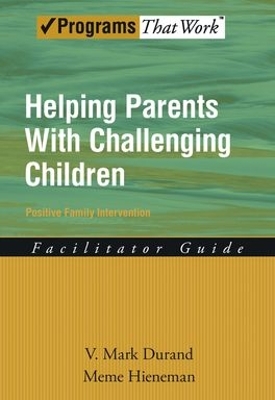Programs That Work
1 total work
Helping Parents With Challenging Children
by V Mark Durand and Meme Hieneman
Published 20 March 2008
One of the main concerns of parents of children with developmental disabilities such as autism is the management of problem behaviour. Frequent incidents of aggression, self-injury, and tantrums, among others, can be the most difficult obstacles to placing a child in schools or other community settings. Children are unnecessarily isolated and are not given the opportunity for socialization because parents feel it is impossible to avoid these problem behaviours. In fact, it is often the parents' attitude itself that is the greatest obstacle - by assuming the worst about their child's behaviour, they create an environment where change is impossible. In a study that followed children from age 3 to age 6, the most significant factor for predicting later behavioural problems was not the extent of the child's disability, or the severity of earlier problems, but the level of parental optimism.
This manual is the result of an evidence-based program that teaches positive skills to parents of young children with disabilities. Many parents feel powerless in the face of their child's disability, and therefore give up on trying to change problem behaviour. This 8-week program teaches parents to identify these 'hopeless' thoughts, and provides optimistic alternatives. Sessions include how to identify behaviour triggers, and strategies for managing these situations, replacing destructive behaviours, and maintaining a positive outlook on the child's development. By the end of the treatment, parents will have created a behaviour management strategy to use in the future, and will have a more effective, optimistic attitude. A corresponding workbook provides forms for monitoring the child's behaviour, homework assignments, and positive reinforcement for parents.
This manual is the result of an evidence-based program that teaches positive skills to parents of young children with disabilities. Many parents feel powerless in the face of their child's disability, and therefore give up on trying to change problem behaviour. This 8-week program teaches parents to identify these 'hopeless' thoughts, and provides optimistic alternatives. Sessions include how to identify behaviour triggers, and strategies for managing these situations, replacing destructive behaviours, and maintaining a positive outlook on the child's development. By the end of the treatment, parents will have created a behaviour management strategy to use in the future, and will have a more effective, optimistic attitude. A corresponding workbook provides forms for monitoring the child's behaviour, homework assignments, and positive reinforcement for parents.
